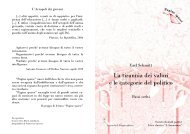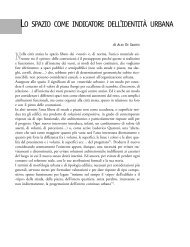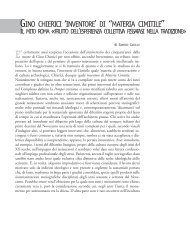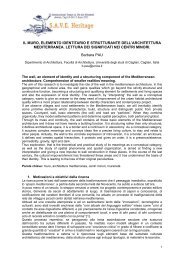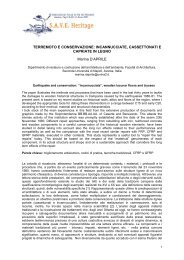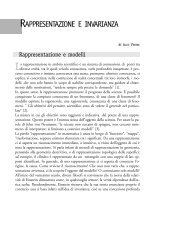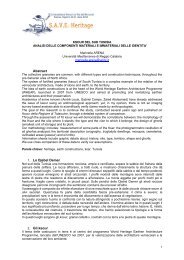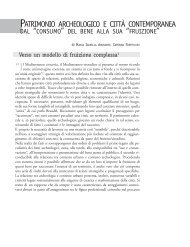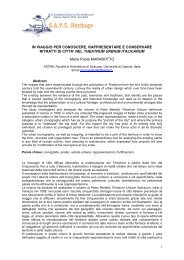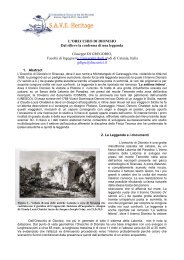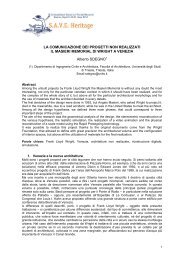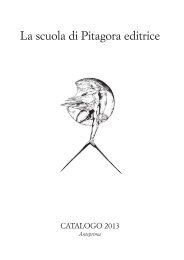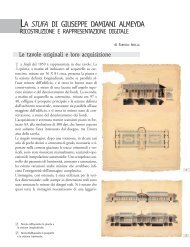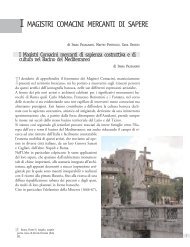Archaeology and nature: hyblean cultural landscape and territorial ...
Archaeology and nature: hyblean cultural landscape and territorial ...
Archaeology and nature: hyblean cultural landscape and territorial ...
You also want an ePaper? Increase the reach of your titles
YUMPU automatically turns print PDFs into web optimized ePapers that Google loves.
Recognizing Cultural Heritage for Social Sustainability: A Spirit of Place<br />
Perspective<br />
Juliana FORERO, Liangping HONG 1<br />
(1) School of Architecture <strong>and</strong> Urban Planning, Huazhong University of Science <strong>and</strong> Technology, Wuhan,<br />
China<br />
Abstract<br />
This article discusses how through the acknowledgement of the spirit of the place for <strong>cultural</strong> heritage<br />
preservation, within the social sustainability context, it is possible to achieve sustainable development<br />
processes. After a brief review of these theories, the analysis of the creation of the urban park Mirador de los<br />
Nevados for the renewal of the downtown of the district of Suba in Bogotá - Colombia, give some ideas on<br />
how the link between social sustainability <strong>and</strong> <strong>cultural</strong> heritage preservation, can bring up a set of processes<br />
<strong>and</strong> practices for the enhancement of sustainable <strong>cultural</strong> <strong>and</strong> urban heritage preservation, without leaving<br />
aside the environmental <strong>and</strong> economic elements.<br />
Keywords: <strong>cultural</strong> heritage, spirit of place, social sustainability, sustainable development<br />
1. Introduction<br />
Theories for Sustainable development principal dimensions –economic, environmental <strong>and</strong> socio-<strong>cultural</strong>-<br />
have not been equally developed <strong>and</strong> thus their relationship remains unclear. Academic <strong>and</strong> political<br />
approximations have generally been limited to economic <strong>and</strong> environmental sustainability, while literature<br />
about social sustainability is still inchoate. Indeed, social sustainability is still an under-theorized <strong>and</strong><br />
oversimplified concept. Nonetheless, in the recent years, social sustainability has been slowly recognized as<br />
a fundamental component of sustainable development. Consequently, it has started to play an increasing<br />
role in urban planning <strong>and</strong> to be included in the governments’ agenda (9) (23).<br />
Urban <strong>cultural</strong> heritage is an essential element of city sustainable development. Nevertheless, research<br />
concerning the relationship between sustainable development <strong>and</strong> urban <strong>cultural</strong> heritage plays almost no<br />
role in social sustainability debates (34). Most studies ignore the social function of the <strong>cultural</strong> heritage <strong>and</strong><br />
focus on two main fields: sustainable tourism <strong>and</strong> environmental degradation affects on material heritage;<br />
other studies list monuments, buildings <strong>and</strong> conservation areas, implying that the worthiness of <strong>cultural</strong><br />
heritage only relates to the tangible objects (33).<br />
To find new ways to interpret the relationship between <strong>cultural</strong> heritage <strong>and</strong> sustainable development, the<br />
debates regarding <strong>cultural</strong> heritage should be framed into the social sustainability studies. From this<br />
perspective the importance of the social function of <strong>cultural</strong> heritage would be recognized not only in the<br />
theory but also in the practice, while at the same time it would be a tool for the social sustainability<br />
development. The Spirit of Place theory, which embraces the essential categories for heritage studies -<br />
identity, memory <strong>and</strong> territory- <strong>and</strong> its sustainability, offer a model to integrate <strong>cultural</strong> heritage into<br />
sustainable development paradigm.<br />
1168



